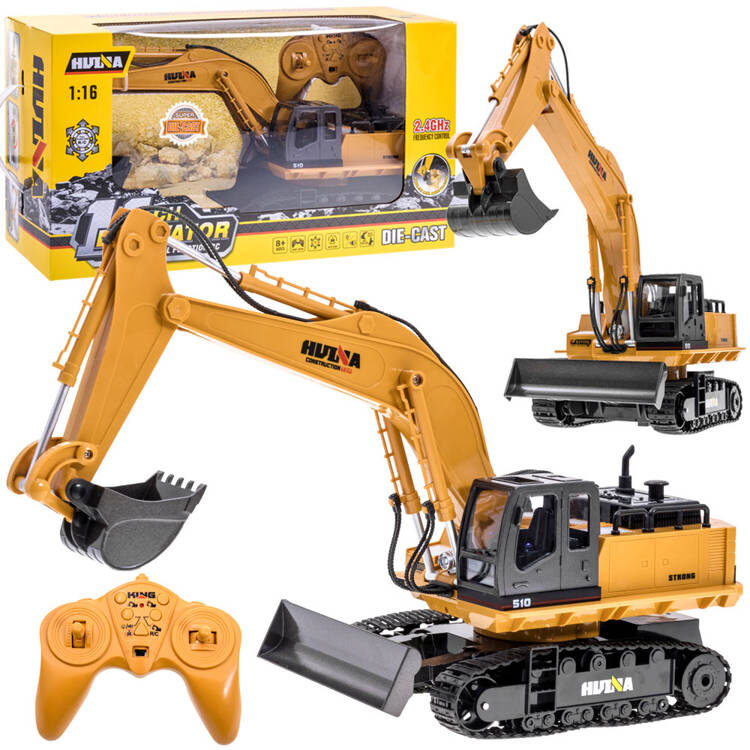Comprehending How Excavator Functions and Its Influence on Performance
Excavators play a necessary role in building and construction and mining procedures, depending on a complex interaction of mechanical and hydraulic systems. Their ability to do a variety of jobs rests on both their style and the modern technology incorporated within. Recognizing these parts can greatly affect functional effectiveness and productivity. As innovations proceed to reshape the market, one need to think about how these modifications will influence future methods and efficiency.
The Fundamentals of Excavator Mechanics

The Function of Hydraulic Systems in Excavators
At the heart of excavator operation lies the hydraulic system, which plays a critical duty in powering the maker's features and movements. This system uses pressurized hydraulic liquid to transfer power, allowing different actions such as moving, training, and digging. By taking advantage of the principles of hydraulics, excavators can carry out jobs with amazing accuracy and pressure, enhancing total operational efficiency.The hydraulic system contains crucial components, including valves, pumps, and cylinders, which work together to manage the flow and direction of the liquid. When the driver engages the controls, the hydraulic fluid is directed to details cylinders, converting the operator's commands right into physical motion. This system enables for smooth and responsive actions, which are vital in building and excavation environments. double e volvo rc excavator. The effectiveness of the hydraulic system straight impacts the productivity and convenience of the excavator, making it an essential aspect in modern-day excavation processes
Secret Parts of an Excavator
Comprehending the key components of an excavator is essential for realizing how this powerful machine runs. An excavator includes several considerable components, including the undercarriage, residence, boom, pail, and arm. The undercarriage gives stability and wheelchair, often featuring wheels or tracks to navigate different terrains. Your home includes the engine and hydraulic systems, permitting the driver to regulate movement and power the equipment. The boom prolongs from your home, allowing upright reach, while the arm connects to the container, helping with excavating and lifting operations.Additionally, the taxi houses the operator, outfitted with controls for exact maneuvering. Each of these components plays an important duty in the excavator's total performance, adding to its performance and efficiency on building and construction sites. Comprehending these parts assists in enhancing and preserving excavator performance, ensuring jobs are completed securely and effectively.
Attachment Convenience and Its Benefits
Attachment versatility is a vital element of excavators, enabling drivers to change in between different tools customized for details jobs. This flexibility not only enhances work effectiveness but additionally adds to cost-effectiveness by decreasing the need for several devices. Recognizing the various sorts of add-ons readily available can substantially influence the general performance and functionality of an excavator on job sites.
Sorts of Attachments
While excavators are primarily recognized for their digging abilities, their real convenience depends on the vast array of attachments readily available. These accessories enhance the excavator's functionality, allowing it to perform numerous jobs past excavation. Usual add-ons consist of buckets (for excavating and scooping), hydraulic thumbs (for comprehending materials), and augers (for piercing openings) Grapples are used for moving and dealing with debris, while rippers can separate hard surface areas. Other specialized add-ons, such as trenchers and plows, make it possible for excavators to adapt to certain task requirements. This variety not only boosts the machine's energy throughout various markets, including demolition, landscaping, and building and construction, but likewise allows operators to customize their equipment to fulfill specific task demands efficiently.
Boosted Task Performance
Making the most of task performance is a main benefit of utilizing different excavator add-ons. Different accessories permit an excavator to carry out several jobs without requiring to switch devices, conserving valuable time and labor. Utilizing a hydraulic hammer can damage concrete while a container accessory can dig deep into dirt, allowing a smooth process. This adaptability decreases downtime related to devices adjustments and enhances productivity on-site. Additionally, specialized accessories boost accuracy in tasks such as grading or landscaping, resulting in greater high quality results. The capability to adapt to different job requirements not only enhances procedures however likewise reduces the requirement for extra machinery, making sure that tasks are finished promptly and effectively. Overall, attachment flexibility considerably adds to enhanced task performance in excavation job.
Cost-Effectiveness and Adaptability
Cost-effectiveness is a considerable advantage of making use of functional excavator add-ons. These attachments permit a solitary excavator to perform multiple tasks, lowering the demand for extra machinery and labor - double e volvo rc excavator. By switching over between buckets, hammers, and grapples, drivers can take on various projects, from digging to demolition, therefore maximizing tools use. This versatility not only decreases operational costs yet likewise minimizes downtime connected with changing equipment. In addition, the capability to personalize excavators with specialized attachments improves productivity, as they can effectively handle diverse jobs according to project needs. In conclusion, the combination of cost-effectiveness and flexibility in excavator attachments adds to improved operational efficiency and source allotment in building and construction and excavation projects

Advanced Technology in Modern Excavators
Modern excavators click reference are increasingly outfitted with advanced innovation that transforms excavation processes. Automation enhances operations, while improved fuel performance reduces operational expenses. In addition, wise control systems improve precision and safety, noting a considerable development in excavation tools.
Automation in Excavation Processes
As excavation technology develops, automation has arised as a critical part in improving performance and precision on task websites. Modern excavators are furnished with advanced automated systems that assist in jobs such as grading, excavating, and trenching with minimal driver intervention. These systems use sensing units, GPS, and machine discovering algorithms to ensure exact placing and depth control, substantially minimizing the margin for mistake. Furthermore, automation allows drivers to concentrate on strategic decision-making as opposed to manual controls, causing boosted productivity generally. Such technologies not only enhance operations however also enhance security by decreasing human error in complicated procedures. The integration of automation in excavation processes represents a significant improvement in building and construction technology, driving the market towards higher efficiency and efficiency.
Improved Gas Performance
Improvements in technology have actually likewise brought about considerable improvements in gas performance for modern excavators. Modern equipments are equipped with innovative engines that enhance power output while reducing gas intake. These engines use ingenious combustion modern technologies, such as turbocharging and direct fuel injection, to enhance efficiency and effectiveness. In addition, light-weight materials in building and construction reduce total weight, allowing for much less power expenditure throughout procedure. The introduction of variable rate controls enables operators to change engine efficiency according to specific tasks, better reducing gas use. Because of this, these enhancements not only reduced functional costs but also add to ecological sustainability by lowering emissions. Overall, improved fuel effectiveness in excavators is an essential advancement that strengthens productivity and economic stability in the building and construction sector.
Smart Control Systems
While drivers navigate progressively intricate task sites, wise control systems in excavators have arised as vital devices for enhancing efficiency and precision. These sophisticated modern technologies make use of algorithms and sensors to check different parameters such as lots weight, terrain problems, and functional performance. By immediately adjusting hydraulic features, wise systems optimize equipment performance, resulting in boosted performance and decreased endure parts. Additionally, operators gain from intuitive interfaces that offer real-time responses and diagnostics, enabling informed decision-making. This integration of innovation not just simplifies operations however likewise decreases human mistake, adding to more secure job environments. As the construction industry continues to progress, wise control systems will certainly play a crucial duty fit the future of excavator efficiency and effectiveness.
Enhancing Operational Effectiveness With Excavators
Excavators play a crucial role in boosting operational efficiency across numerous construction and excavation tasks. Their versatility enables multiple jobs, consisting of excavating, training, and material handling, which improves workflows and reduces the demand for added equipment. With powerful hydraulic systems, excavators can carry out durable tasks with accuracy, substantially decreasing the time needed to full tasks. The combination of innovative modern technology, such as GPS and automated controls, better maximizes their operation, enabling drivers to attain better precision and lower product waste. Furthermore, modern excavators are made to take in less gas and minimize exhausts, adding to both price financial savings and environmental sustainability. By utilizing excavators successfully, construction teams can enhance performance, satisfy job due dates, and enhance overall site monitoring. This multifunctionality and performance make excavators indispensable tools in the modern-day building landscape.
The Future of Excavators in Building And Construction and Mining Industries
As the construction and mining markets develop, the future of excavators is poised for considerable transformation driven by technological development and altering operational needs. Advancements in automation and expert system are improving excavator capacities, enabling improved precision and performance in operations. Self-governing excavators are emerging, reducing the requirement for human treatment and reducing the danger of accidents.Moreover, the combination of telematics and IoT technology allows real-time surveillance of machine performance and anticipating maintenance, enhancing uptime. Eco-friendly styles, including electrical and hybrid models, are acquiring traction, lining up with sustainability objectives within the industry.Additionally, using sophisticated products and lighter styles boosts gas performance while maintaining performance standards. As these fads progression, excavators will play an important duty in fulfilling the increasing demands for productivity and safety in construction and mining, eventually changing functional landscapes.
Regularly Asked Inquiries
How Do Climate Condition Impact Excavator Performance?

Weather problems considerably influence excavator efficiency, as rain and mud can hinder grip and security, while severe temperatures may affect hydraulic systems. Operators should adapt to these variables to ensure perfect capability and safety and important link security throughout operations.
What Safety Procedures Should Operators Comply With While Utilizing Excavators?
Precaution for excavator drivers include putting on proper personal safety devices, carrying out pre-operation assessments, guaranteeing appropriate interaction with ground personnel, preserving a safe distance from overhanging dangers, and adhering to well established operational procedures to stop accidents.
Exactly How Often Should Excavators Be Maintained for Optimal Efficiency?
Excavators need to be maintained consistently to ensure peak efficiency, usually every 250 operating hours or as defined by the maker. Regular checks improve dependability, prevent unexpected failures, and extend the life-span of the equipment.
What Is the Average Lifespan of an Excavator?
The typical life-span of an excavator generally varies from 10,000 to 15,000 hours of procedure. Factors influencing long life include upkeep practices, running conditions, and the top quality of the machine itself, affecting total performance and effectiveness.

Can Excavators Operate on Unequal Surface Successfully?
Excavators can operate properly on uneven terrain because of their articulated layouts and adjustable tracks. These features enable them to keep security and traction, enabling effective procedure in challenging environments generally experienced in building and construction and landscape design projects. Each of these elements plays an important function in the excavator's overall functionality, adding to its efficiency and effectiveness on find this construction sites. Optimizing work effectiveness is a main advantage of using various excavator add-ons. While drivers browse progressively complicated job sites, smart control systems in excavators have actually arised as necessary tools for enhancing efficiency and accuracy. Excavators play a necessary function in improving functional efficiency throughout different building and excavation projects. Advances in automation and fabricated intelligence are reshaping excavator capabilities, allowing for enhanced accuracy and efficiency in procedures.